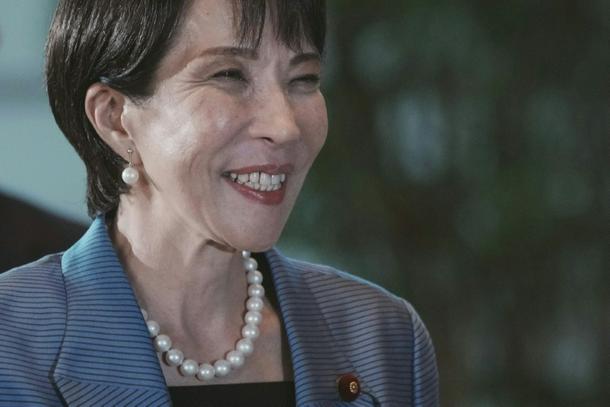
Sanae Takaichi is a former heavy metal drummer and Margaret Thatcher admirer
Tokyo (AFP) - Sanae Takaichi was named Japan’s first woman prime minister Tuesday, with the social conservative saying she wanted “candid discussions” with US President Donald Trump just days ahead of his visit to Tokyo.
Japan’s fifth premier in as many years leads a minority government and has a bulging in-tray, not least the scheduled arrival of the US leader next week.
But in her first remarks in office, she said her priority was to tackle inflation, a major source of anger among voters, and would soon draft an “economic package” to deal with rising prices.
The former heavy metal drummer and Margaret Thatcher admirer became head of the Liberal Democratic Party (LDP) on October 4, but its coalition collapsed days later.
This forced Takaichi to form an alliance with the reformist, right-leaning Japan Innovation Party (JIP), which was signed on Monday.
She was approved by parliament as prime minister on Tuesday and formally took office.
Her first challenge will be Trump’s visit, during which she plans to discuss bilateral issues as well as the broader Asia-Pacific region, the Middle East, and Ukraine.
“I want to build relationships of trust,” she told journalists.
Being in a minority in both houses of parliament, the new coalition will need support from other parties to push through legislation.
Takaichi’s many other headaches include Japan’s declining population as well as the flatlining economy.
“Prices have gone up, and it’s tough,” said pensioner Satoe Tominaga, saying she was “50-50” about the new prime minister.
“Honestly, I mostly shop at 100-yen ($0.66) stores now,” the 77-year-old told AFP in Nara, Takaichi’s hometown.
- US, regional ties -
With Trump’s visit on the horizon, Takaichi handed the foreign minister role to Toshimitsu Motegi who was credited with handling trade ties with the president’s first administration.
The US leader wants Tokyo to stop Russian energy imports and boost defence spending.
Details of Japan’s mooted $550 billion in investments in the US, as part of its latest trade deal with Washington, remain unclear.
Takaichi previously said that “Japan is completely looked down on by China”, and that Tokyo must “address the security threat” posed by Beijing.
But she has since toned down her rhetoric, and last week stayed away from the Yasukuni shrine that honours Japan’s war dead, long a flashpoint in Tokyo’s regional ties.
China’s foreign ministry on Tuesday urged Tokyo to “honour its political commitments on major issues including history and Taiwan”.
China and Japan are key trading partners, but friction over territorial rivalries and military spending has frayed ties in recent years.
Japan hosts around 54,000 US military personnel and the close ally of Washington is part of the Quad group, along with Australia and India, which is seen as a counter to Beijing.
- ‘A woman’s perspective’ -
EU chief Ursula von der Leyen congratulated Takaichi for “making history” as Japan’s first woman premier.
Takaichi had promised a cabinet with “Nordic” levels of women, up from two under predecessor Shigeru Ishiba. The record for Japan is five.
But she named only two other women in her 19-strong cabinet, with Satsuki Katayama in charge of finances and the Japanese-American Kimi Onoda taking on the economic security portfolio.
Japan ranked 118 out of 148 in the World Economic Forum’s 2025 Global Gender Gap Report. Around 15 percent of lower house MPs are women.
Takaichi has said she hopes to raise awareness about women’s health struggles and has spoken candidly about her own experience with menopause.
But she is seen as socially conservative, opposing revising a 19th-century law requiring married couples to share the same surname, and wants the imperial family to stick to male-only succession.
“I’d be happy if we saw more policies from a woman’s perspective: support for childcare, and help for women returning to work after having children,” student Nina Terao, 18, told AFP in Nara.
Yu Uchiyama, political science professor at the University of Tokyo, described Takaichi’s appointment as “epoch-making”.
But “just because she has become the first woman prime minister doesn’t mean we will move more toward the direction of DEI (diversity, equity and inclusion),” he told AFP.
Takaichi will also be under pressure to restore the fortunes of the LDP after a string of poor election results that cost Ishiba his job.
Smaller parties gaining support include the populist Sanseito, which calls immigration a “silent invasion”.